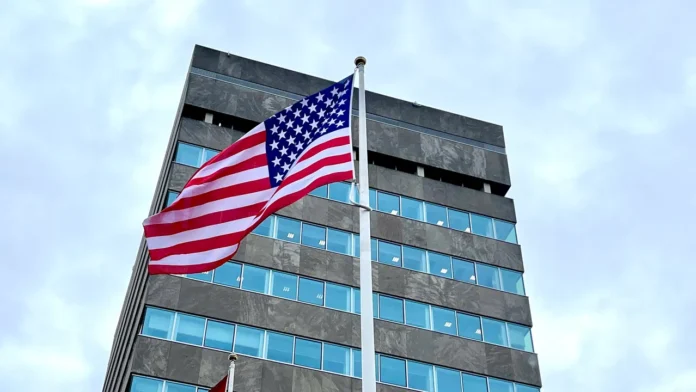Chinese high-tech company Huawei has managed to develop advanced chips despite an export ban on ASML’s chip machines. According to geopolitical analyst Sanne van der Lugt, the Netherlands has committed a major strategic blunder. “The Netherlands has been put to shame by the U.S.”
ASML holds the only technology in which the Netherlands and the European Union are ahead of China and the United States. According to the geopolitical analyst and China expert Sanne van der Lugt, ASML’s position, and the important Dutch trump card is being gnawed at, remarkably at the hands of the Dutch government itself.
“First the US ruled that ASML could not sell its latest chip machines, the EUV machines, to Chinese companies. Then that export restriction was again tightened by the United States and the less advanced DUV machines were not allowed to go to China either. But as expected, that backfired,” says Van der Lugt.
No restriction
When the U.S. sanctions were announced, ASML CEO Peter Wennink already explained that export controls would not restrict China much. That prediction seems to be coming true with the 5nm (5 nanometers, ed.) chips Huawei has developed together with Chinese chipmaker SMIC.
Not competing
“Before those sanctions took effect, China was lagging in lithography (the ‘printing’ of chips, in which ASML still has a near monopoly position today). And that technology would not be developed in China any time soon either,” Van der Lugt said. “The Chinese government had set itself the goal of catching up technologically with the West and had to invest in many different technologies. Lithography was not at the top of the list. Developing this knowledge is incredibly expensive and ASML has such a strong market position that there was no revenue model for Chinese companies to make.”
Forced
But export restrictions made everything different, and ensured that the Chinese government did have to make those investments. Just as Huawei surprised many people earlier with its rise in the phone market, the same thing seems to be happening now. “China has been forced to prioritize the development of advanced chips, it had to invest in them because of the sanctions. ”
And with that, it is no longer inconceivable that ASML will eventually add a Chinese competitor, Van der Lugt said. “ASML’s position was enormously strong. It still is but it is being gnawed at. Moreover, because the Dutch government is so inclined to listen to the U.S., the Netherlands is becoming less attractive as a supplier of technology. Countries with a difficult relationship with the U.S. may be inclined to stop choosing Dutch technology as a result of the situation surrounding ASML. After all, if the U.S. government does not like it, the supply of that technology can stop at any time.”
American companies
In doing so, it is noteworthy that China made its progress thanks to technology it imported from American companies. “The US government only requires export licenses for technology where they see a risk to national security. Since 2022, the U.S. government has required export licenses for chip technology exports to China. Because the percentage of American technology in ASML’s machines is minimal, the U.S. government cannot impose an export ban on ASML. That’s why the U.S. government has put so much pressure on the Dutch government to impose that export measure,” Van der Lugt said.
“But because the Dutch government didn’t go far enough, the U.S. government changed its own regulations, which now allow them to impose export restrictions on foreign companies even if there is no U.S. technology in them at all. After they introduced those regulations, the U.S. government introduced export restrictions on older DUV machines. So these are US export restrictions on technology that the US does not have. With this, the US is bypassing the sovereignty of the Netherlands,” Van der Lugt explained.
Weaken
As a result, export restrictions are being used not only to restrict China but also to weaken ASML’s position, the analyst observes. “To give competitors of ASML some air. It is a thorn in the side of the Americans that such a small country controls such an important technology, a technology that is essential for the fourth industrial revolution and also important for maintaining the dominant position of the U.S. military.”
Not much can be done now about the strategic blunder committed by the Dutch government. “The damage has been done. The damage is great but still manageable – ASML still has a big lead over its competition. But it’s clear that politicians in the future need to think much more carefully about these kinds of issues.”
Source: Studio040
Translated by: Chaitali Sengupta. She also gives online INBURGERING classes.
















